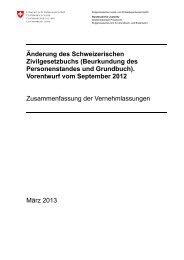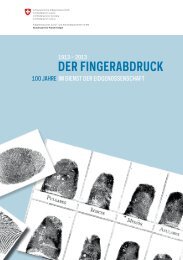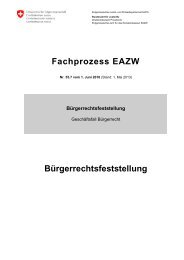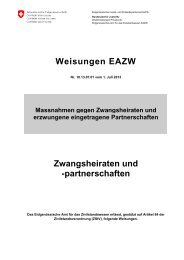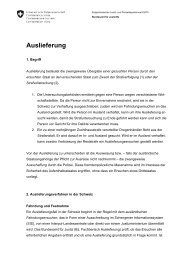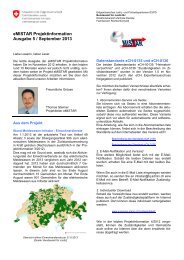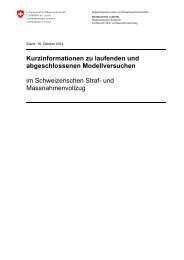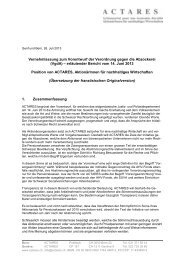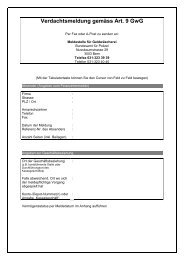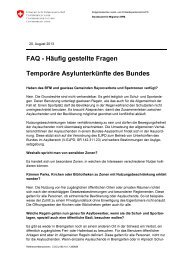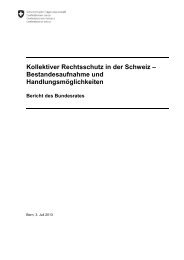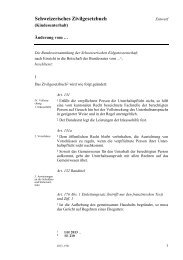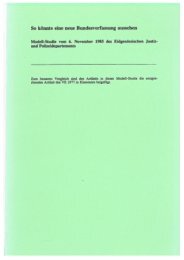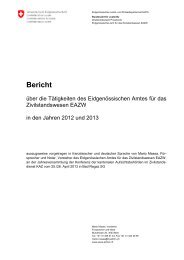BERICHT INNERE SICHERHEIT DER SCHWEIZ ... - EJPD - admin.ch
BERICHT INNERE SICHERHEIT DER SCHWEIZ ... - EJPD - admin.ch
BERICHT INNERE SICHERHEIT DER SCHWEIZ ... - EJPD - admin.ch
Erfolgreiche ePaper selbst erstellen
Machen Sie aus Ihren PDF Publikationen ein blätterbares Flipbook mit unserer einzigartigen Google optimierten e-Paper Software.
New legislation on foreign nationals<br />
Under Article 116 of the new legislation on foreign<br />
nationals (Aliens Act) human trafficking will<br />
qualify as a felony. Human trafficking will also be<br />
listed as a felony in the Federal Act on the Surveillance<br />
of Post and Telecommunications and in<br />
the Federal Act on Covert Investigations. Elevating<br />
human trafficking to the status of a felony<br />
means that in future law enforcement agencies<br />
will have greater investigating and prosecuting<br />
competence.<br />
Increasing the penalty for smuggling on a<br />
commercial basis is expected to have a preventive<br />
effect. Furthermore, incorporating new offences<br />
su<strong>ch</strong> as illegal transit, transit smuggling, bogus<br />
marriages or deception of officials, will help<br />
combat forms of smuggling that are more difficult<br />
to detect.<br />
Electronic communication networks<br />
The year 2005 saw the completion of the consultation<br />
procedure on the report and preliminary<br />
drafts for the revision of the Swiss Criminal Code<br />
and the Military Criminal Code. The drafts under<br />
review regard the criminal responsibility of<br />
providers (Preliminary Draft A) and federal<br />
jurisdiction in prosecuting crimes committed by<br />
means of electronic communication networks<br />
(Preliminary Draft B). The Federal Department<br />
of Justice and Police (FDJP) intends to submit the<br />
results of the consultation proceedings and new<br />
draft legislation pertaining to Article 344 of the<br />
Swiss Criminal Code (electronic communication<br />
networks) to the Federal Council in 2006. Under<br />
the new legislation, the Office of the Attorney<br />
General of Switzerland and the Federal Criminal<br />
Police would thus be empowered to conduct initial<br />
investigations into criminal offences committed<br />
by means of electronic communication<br />
networks in su<strong>ch</strong> cases where it is has not yet been<br />
determined whi<strong>ch</strong> canton is responsible. Regarding<br />
Preliminary Draft A, the Federal Council has<br />
yet to decide on the further course of procedure.<br />
Weapons Act<br />
Switzerland’s joining of the S<strong>ch</strong>engen Agreement<br />
means that the Weapons Act needs to be<br />
extended in a number of essential respects; thus,<br />
the unauthorised possession of firearms becomes<br />
a punishable offence, the trading of firearms<br />
between private individuals requires a certificate<br />
REPORT 2005 SUMMARY<br />
of pur<strong>ch</strong>ase as is the case in commercial trading,<br />
and firearms imported into Switzerland or manufactured<br />
in the country have to be marked so<br />
they can be traced back to the original source.<br />
Finally, the licensing practice will be standardised<br />
throughout Switzerland.<br />
Apart from these <strong>ch</strong>anges, whi<strong>ch</strong> have already<br />
been agreed upon, the Federal Council has proposed<br />
further reforms. Under these reforms,<br />
imitation guns, air guns, blank cartridge guns and<br />
airsoft guns are to be placed in the same category<br />
as normal weapons and would<br />
therefore be subject to the<br />
same legal regulations. However,<br />
this only applies if the<br />
weapon has endangering potential; for example<br />
if it could be mistaken for a real one or if it has a<br />
certain muzzle power. Likewise, selling weapons<br />
anonymously, for instance over the Internet or<br />
through advertisement, would become illegal<br />
under new legislation. It has further been proposed<br />
to prohibit the improper carrying of dangerous<br />
objects. It would thus be possible for state<br />
security forces to confiscate baseball bats, metal<br />
pipes, bicycle <strong>ch</strong>ains and other objects carried in<br />
public before they can be used to injure people or<br />
commit offences. However, this would only apply<br />
if it is obvious that su<strong>ch</strong> objects are meant for use<br />
as weapons.<br />
The draft also includes legislation on the<br />
ex<strong>ch</strong>ange of data between fedpol and the army.<br />
Under proposed legislation, fedpol would be<br />
responsible for establishing a national office to<br />
evaluate tracing data on firearms. The amendment<br />
under review does not contain any reforms<br />
limiting hunting or shooting sports, however.<br />
Cooperation between<br />
intelligence services<br />
Weapons Act substantially<br />
amended and improved.<br />
When planning for the years 2003 through<br />
2007, the Federal Council defined its ninth objective<br />
– safeguarding security – in some detail:<br />
accordingly, Switzerland’s security policy instruments<br />
must fully interact with ea<strong>ch</strong> other and be<br />
flexible.Besides,the instruments for safeguarding<br />
domestic security were further strengthened in<br />
2005 with the introduction of<br />
numerous police and judicial<br />
measures. One of these measures<br />
was the decision taken by<br />
the Federal Council on 22 June 2005 that in future<br />
the Strategic Intelligence Service (SIS) at the<br />
Federal Department of Defence, Civil Protection<br />
SAP and SIS – Joint evaluation<br />
and analysis forums.<br />
DOMESTIC SECURITY REPORT SWITZERLAND<br />
89



